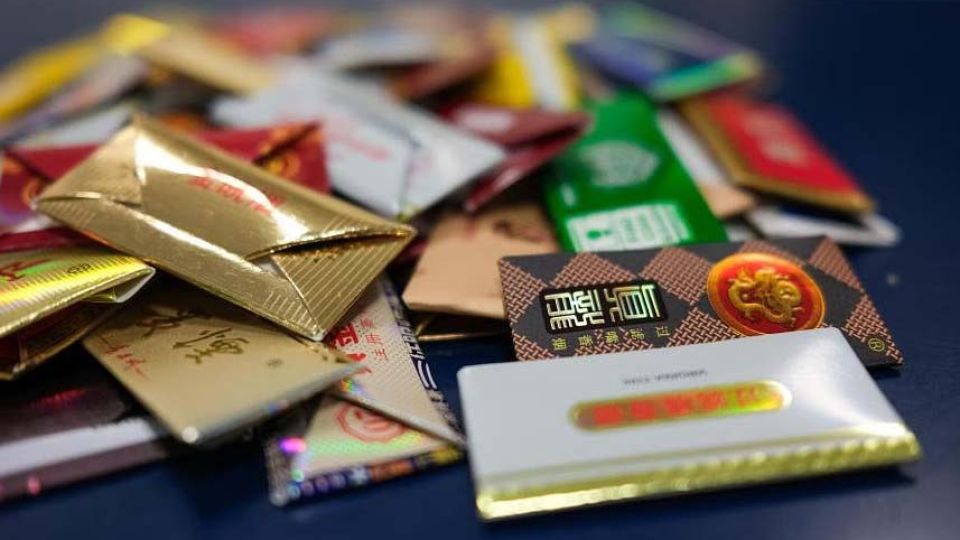July 10, 2024
BEIJING – Housewife Li Jiu would check her son’s belongings every other day to make sure that he was not playing with cigarette cards, which are made by cutting up old cigarette boxes and folding them into small rectangles.
She found a few of the cards neatly placed in her son’s mathematics textbook in June and confronted the Primary 5 boy about them.
“He said a classmate had given him those cards so that they could play games with them,” said Madam Li, 37, who lives in northern Hebei province. “I told him to return the cards to his friend, and to tell me if others offer these to him again.
“I’m afraid he might become addicted to playing with those cards, and become curious about smoking.”
The trend of children playing with yan ka, or cigarette cards, started in recent months but it is not clear how the trend started, Chinese media reported.
The young are said to be drawn to these cards because of their attractive designs and the sense of playing with something “forbidden”.
One game played using these cards involves each player placing a cigarette card on a flat surface. Players take turns to try and flip the cards by slamming their hand on the surface. If successful, they get to keep their opponents’ cards.
These cards have become so popular that the authorities are taking action for fear that they will expose children to tobacco brands and lead to more youngsters picking up the smoking habit.
On June 30, the semi-official Beijing Tobacco Control Association warned that cigarette cards are fast catching on among primary school pupils.
These are a form of “early exposure to tobacco trademarks that may lead to psychological suggestions to try out smoking”, it added.
It noted that cigarette cards contain information about tobacco, adding that children have been known to rummage through rubbish to look for discarded cigarette boxes.
During the past two weeks, local governments – from northern Shanxi to south-western Chongqing to eastern Shandong – have rolled out a slew of enforcement measures, including checks on stationery shops near schools and wholesale markets selling children’s items, to stamp out sales of the cards.
However, a Straits Times check on July 9 found that cigarette cards can be bought on e-commerce platform Taobao.
A box of 100 cigarette cards costs about 13 yuan (S$2.40), and e-commerce sellers market the cards as a way to get children to stop being addicted to mobile phones or rummaging through rubbish.

E-commerce sellers market the cards as a way to get children to stop being addicted to mobile phones or rummaging through rubbish. PHOTO: TAOBAO/THE STRAITS TIMES
China, the world’s largest consumer of tobacco products with some 300 million users, has been on a years-long drive to lower its smoking rates, in a move to rein in ballooning healthcare costs. It has banned smoking in most indoor public places and raised public awareness of its dangers.
A report by the National Health Commission and the Chinese Centre for Disease Control and Prevention showed that the smoking rate among middle-school students has fallen by 0.5 percentage point to 4.2 per cent from 2021 to 2023.
The report, released on May 31, World No Tobacco Day, surveyed more than 250,000 middle-school students aged between 13 and 18 across China between September 2023 and January 2024.
Developed cities such as Shanghai, Shenzhen and Beijing have also seen a decline in the number of adult smokers in recent years.
About one in five adults in Shanghai smoked in 2023, down from one in three in 2010.
In Beijing, the figure has fallen to 19.9 per cent in 2023, down from 23.4 per cent 10 years ago.

China is the world’s largest consumer of tobacco products, with some 300 million users. PHOTO: THE STRAITS TIMES
Still, parents told ST that they worry about cigarette cards, which they saw as a gateway to teenage smoking.
More should be done to curb teenage smoking, they said, including by having plain packaging for cigarettes, and banning vapes.
“What good can come out of playing with cigarette cards? I’m worried that my son will start smoking if he keeps coming into contact with the cards,” said Madam Yu Binqi, 38, a restaurant manager in Beijing.
“All these discarded cigarette boxes smell of tobacco,” she added.
Purchasing manager Bo Lei, 40, in Beijing said he has been keeping a closer eye on his used cigarette packs after his 13-year-old son casually mentioned over dinner that his classmates had been playing with yan ka.
Mr Bo said that he hoped his son does not pick up smoking as a result of exposure to cigarette cards.
“I constantly tell my son that it’s too late for me to try and quit because I’ve been smoking for at least the past 20 years, but there’s still hope for him,” he told ST.
Said Mr Bo: “The clampdown will definitely help send the right signals that minors should be better protected from the dangers of smoking.”


